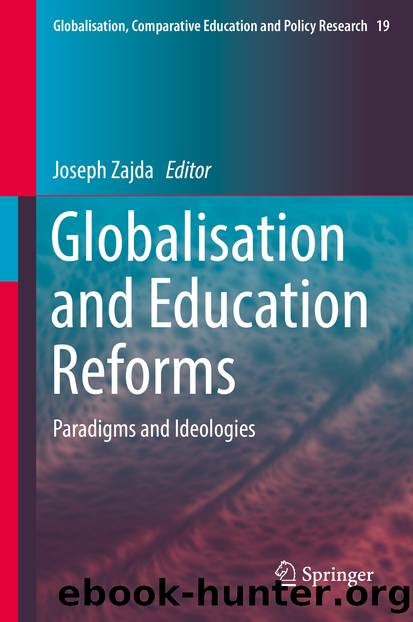Globalisation and Education Reforms by Joseph Zajda

Author:Joseph Zajda
Language: eng
Format: epub
Publisher: Springer Netherlands, Dordrecht
Evaluation
The immediate Post-World War II era international development institutions promoted Keynesian economics that accommodated government intervention, particularly in the area of investment in infrastructure and employment promotion. While the new nation-state had the opportunity to develop a national university system, the emerging global institution policies that rationalized free-market capitalism constrained investment in social services sector. The World Bank and Bilateral agencies had opted to focus on investment in education infrastructure that would yield immediate return on investments. This policy had implication for the development of the public university system for Kenya for years to come. The university infrastructure development was relegated to second tier consideration, behind technical and vocational education.
The finance-driven austerity policies that originated in 1970s U.S. and Britain (Carnoy, 1995) through the global finance institutions had been imposed on Kenya by way of Structural Adjustment Programs (SAPs) prescriptions of the World Bank and IMF. While the welfare-state model still prevailed in principle, the public sector was fiscally starved of its capacity to deliver services. The collapse of the Soviet Union in 1991 marked another shift in international development discourse and practice. The prevailing global development policies limited governmental capacity to develop new university infrastructure. Expansion in national university system infrastructure was only possible through cannibalism of the non-university tertiary education infrastructure.
In the next decade, Kenya now faced a new global environment that accommodated political democratization and free-market individual capitalism, defined by a neoliberal economic ideology. These changes marked a decade in which the burden of realizing economic, social, and cultural rights was transferred to the individual and away from national governments. The World Bank and independent free-market advocates urged governments to adopt the spread of private institutions and increase the adoption of cost-recovery mechanisms in public institutions at the higher education level (Patrinos, 1990; Psacharopolous, 1991). The Kenya government steered clear of intent to intervene and expand higher education infrastructure in ways that would compromise membership in a world society that was defend by allegiance to the economic and political globalization processes that dominated the 1990s.
Somewhat ironically, the social and political democratic space opened up by the advent of global democratization created civil society gains that contributed to the next significant shift in global development ideology, beginning in 2000. This shift was heralded by the United Nations’ assent to the MDGs (United Nations, 2000), and the reaffirmation of the important role of government in the realization of human rights as it pursued national development. It offered space for previously marginalized populations to claim their rights as citizens. The promulgation of the 2010 constitution in Kenya, and the creation of devolved governments further expanded access to the authority for the enactment of citizenship rights. It is during the first year of the existence of county governments in Kenya that we see an exponential growth in university infrastructure. However, since the central government has to continue to interface with the global institutions that continue to promote free-market capitalism, the expansion in the university system has only been realized through the elevation of non-university institutions.
Download
This site does not store any files on its server. We only index and link to content provided by other sites. Please contact the content providers to delete copyright contents if any and email us, we'll remove relevant links or contents immediately.
Spare by Prince Harry The Duke of Sussex(5197)
Navigation and Map Reading by K Andrew(5158)
Tuesdays with Morrie by Mitch Albom(4784)
Machine Learning at Scale with H2O by Gregory Keys | David Whiting(4313)
Cracking the GRE Premium Edition with 6 Practice Tests, 2015 (Graduate School Test Preparation) by Princeton Review(4294)
Never by Ken Follett(3957)
Goodbye Paradise(3810)
What It Really Takes to Get Into Ivy League and Other Highly Selective Colleges by Hughes Chuck(3760)
Fairy Tale by Stephen King(3399)
Harry Potter and the Prisoner of Azkaban (Book 3) by J. K. Rowling(3360)
Pledged by Alexandra Robbins(3179)
Kick Ass in College: Highest Rated "How to Study in College" Book | 77 Ninja Study Skills Tips and Career Strategies | Motivational for College Students: A Guerrilla Guide to College Success by Fox Gunnar(3130)
Reminders of Him: A Novel by Colleen Hoover(3121)
A Dictionary of Sociology by Unknown(3085)
Sapiens and Homo Deus by Yuval Noah Harari(3071)
The Social Psychology of Inequality by Unknown(3031)
Graduate Admissions Essays, Fourth Edition: Write Your Way into the Graduate School of Your Choice (Graduate Admissions Essays: Write Your Way Into the) by Asher Donald(2922)
Will by Will Smith(2920)
Zero to Make by David Lang(2785)
